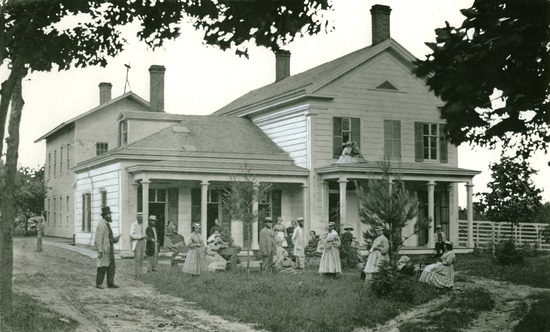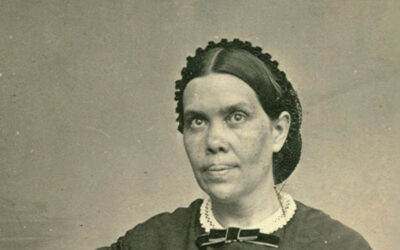One thing you might have heard about Seventh-day Adventists is their emphasis on a vegetarian lifestyle. If you’re wondering why that is, it goes back to our church’s humble beginnings:
As Adventists studied the Bible, they were convicted on how they could glorify God by taking care of their bodies and minds. In turn, the Holy Spirit guided Ellen G. White, a leader in the Seventh-day Adventist Church, to share practical principles of health, including vegetarianism.
Though she never considered meat-eating a sin, she encouraged people to choose a largely plant-based diet. This way, they could be more likely to experience the best possible health and serve God to the best of their ability.
Let’s explore more of what she had to say by looking at:
- Her experience in becoming a vegetarian
- Her teachings about vegetarianism
- Her influence on the Adventist Church when it came to eating a plant-based diet
As we understand her personal journey with vegetarianism, we’ll see her relatability and balanced viewpoint on this topic.
What was Ellen White’s experience in becoming a vegetarian?
Ellen White went from being a heavy meat-eater to a lacto-ovo vegetarian over the course of about 31 years. At the same time, she went from weakness and sickness as a teenager to strength and good health in her later years. God led her step by step in improving her diet and experiencing its blessings.
It all started with a vision she received in 1863.
Ellen White’s health vision

Photo by M. DiFulvio on Unsplash
On June 6, 1863, Ellen White received her first major health reform vision from God, and it led her to change the way she ate.
Here are some snippets about diet that she learned from that vision:
“God gave our first parents the food He designed that the race should eat. It was contrary to His plan to have the life of any creature taken. There was to be no death in Eden…. [He] gave man no permission to eat animal food [meat] until after the flood. Everything had been destroyed upon which man could subsist, and therefore the Lord in their necessity gave Noah permission to eat of the clean animals which he had taken with him into the ark. But animal food was not the most healthy article of food for man.”1
“There are but a few animals that are free from disease.”2
God’s original plan for humans was a plant-based diet. But after the flood, He allowed people to eat meat since plants were unavailable. And many people in the Bible (including Jesus) ate meat.
However, because of increasing sickness in animals and poor meat-processing practices, meat was becoming less and less healthy to eat during Ellen White’s time.
For this reason, she encouraged people to return to a “plain, wholesome diet” so they could keep the body in “as healthy a condition as possible.”3
This vision was the beginning of Ellen White’s journey to better health.
The journey of becoming vegetarian
After the vision in 1863, Ellen White began making changes to her lifestyle habits, including her diet. She decided to avoid meat—a major challenge for her.
During a time when fresh food was not always available, she had relied on meat. (She might have been a little picky, too.) Thus, it was with some reluctance that she began eating whole-grain bread, fruit, and vegetables. Here’s how she puts it:
“For a while it was rather difficult to bring my appetite to bread, for which, formerly, I have had but little relish. But by persevering, I have been able to do this. I have lived for nearly one year without meat.”4
And the results surprised her.
She had thought she needed meat for strength, but she found that her faintness and dizziness went away when she quit eating it.5
And so, she stuck with it.6
But Ellen White was balanced. She never viewed meat-eating as a sin and made exceptions in situations such as the following:
- When vegetables were too expensive. In 1878, she ate venison for a Christmas breakfast that she shared with a family who was very poor.7
- When she traveled and couldn’t get vegetarian food. In 1890, she said, “When I could not obtain the food I needed, I have sometimes eaten a little meat.”8
- When her cooks were still learning to make vegetarian food. Because of how busy Ellen White’s ministry kept her, she hired cooks for her home. But whenever new cooks came, they didn’t have experience with vegetarian cooking. This meant that they may have cooked meat until she had time to teach them vegetarian recipes.9

Photo by Conscious Design on Unsplash
In 1894, she made the decision to stop eating meat under all circumstances.10 In addition to her concern over disease, she was also highly concerned about the cruelty animals experienced at the hands of the meat processing industry.
She did continue to eat fish for a few more years, but became increasingly concerned about the healthfulness there, too:
“In many places fish has become so contaminated by the filth on which they feed as to be a cause of disease.”11
As Ellen White came to the end of her life, she looked back at the way her health had changed over the years:
“I have better health today, notwithstanding I am seventy-six years old, than I had in my younger days. I thank God for the principles of health reform.”12
She lived out the things that she taught and modeled the benefits. We’ll look next at those teachings.
What did Ellen White say about vegetarianism?
Ellen White encouraged a vegetarian diet through her teachings and writings. Though she never promoted extremes and didn’t make it a question of salvation or church membership, she showed how a diet centered around plant foods can improve our lives.
“[Plant foods] impart a strength, a power of endurance, and a vigor of intellect, that are not afforded by a more complex and stimulating diet,” she said.13
Her definition of vegetarianism
Most people think being vegetarian means the elimination of all meat in the diet. And today, that may be true. But Ellen White used the term more loosely to mean eating a diet that is mostly plant-based. It is vegetarian because grown foods are at the center, rather than the diet being built on a base of meat (which was much more common then).
In a letter about the Adventist Church’s views on different topics, she wrote, “All are vegetarians, many abstaining wholly from the use of flesh food, while others use it in the most moderate degree.”14

Photo by Alex Kotomanov on Unsplash
To her, being vegetarian could mean not eating meat at all or eating it only rarely. But either way, it was a decision to move toward the original diet:
“Grains, fruits, nuts, and vegetables constitute the diet chosen for us by our Creator. These foods, prepared in as simple and natural a manner as possible, are the most healthful and nourishing.”15
Many of today’s health authorities agree. Dr. Michael Greger—graduate of Cornell University, physician, speaker, and author—is one of them. He was asked in an interview, “What is the ideal diet for living the longest, healthiest lives?”
His answer:
“A diet centered around whole plant foods, including an array of whole grains, beans, fruit, nuts, and as many vegetables as we can stuff in our face.”16
New York Times journalist and author Michael Pollan summarizes it this way:
“Eat food. Not too much. Mostly plants.”17
Meat’s effect on health

Photo by Towfiqu barbhuiya on Unsplash
One key reason that Ellen White discouraged a diet heavy in meat is that animals have become more unhealthy through the centuries. She was concerned about diseases in animals and the way they would affect humans.18
In 1905, she wrote:
“Cancers, tumors, and all inflammatory diseases are largely caused by meat eating.”19
“Flesh was never the best food; but its use is now doubly objectionable, since disease in animals is so rapidly increasing.”20
And over 100 years later, the medical world is realizing the same thing. The Mayo Clinic states that red and processed meat increase the “risk of death from heart disease, stroke, or diabetes”—all inflammatory diseases that can be affected by lifestyle.
The World Health Organization has also declared that red and processed meat are carcinogens. They can cause stomach and colorectal cancer, and possibly pancreatic and prostate cancer.
At a time when people didn’t know much about cancer, Ellen White’s writings were spot on.
Importance of a nutritionally adequate diet

Photo by Süheyl Burak on Unsplash
Even as Ellen White promoted a vegetarian diet, she saw it as a process rather than a one-time decision. People are different and they should tailor their diets to make sure they’re getting proper nutrition. Our diets are “for the upbuilding of the body…to preserve every power in the best condition for highest service to God and man.”21
With this in mind, she pointed out the importance of finding proper substitutes for meat before giving it up altogether. She especially encouraged replacing meat with plenty of grains, fruits, nuts, and vegetables. Doing so would prevent nutritional deficiencies.22 Today, we’d also mention the value of eating legumes (beans, lentils) to get the protein we’d otherwise get from meat.
Her balanced viewpoint
Ellen White had a very balanced approach to health, encouraging people to do the best that they could in the circumstances they were in. She never made her own life a criterion for others to follow. Instead, she advised them to avoid extremes, study God’s will, and find what was healthiest for them.23
She also never said vegetarianism was a prerequisite for being an Adventist or being saved.24
“I have never felt that it was my duty to say that no one should taste of meat under any circumstances. To say this when the people have been educated to live on flesh to so great an extent would be carrying matters to extremes. I have never felt that it was my duty to make sweeping assertions. What I have said I have said under a sense of duty, but I have been guarded in my statements, because I did not want to give occasion for anyone to be a conscience for another.”25
In situations where people couldn’t afford to replace the meat on their tables or didn’t have access to alternatives, she wrote:
“It was not my duty, nor did I think was the duty of anyone else, to lecture them upon the evils of meat eating…. There is a time to speak and a time to keep silent.”26
How did Ellen White’s teachings on vegetarianism affect the Adventist Church?
Ellen White’s teachings on vegetarianism had a major influence on the Adventist Church. A large number of Adventists consume a plant-based diet low in meat, and many don’t consume red meat or poultry at all. Adventists have also produced many publications about vegetarianism, experimented with meat-free recipes, and created and sold meat substitutes.
Adoption of a vegetarian diet
The way Adventists eat today is in many ways a result of Ellen White’s application of the biblical principle to honor God with our bodies (1 Corinthians 6:19–20; 1 Corinthians 10:31). She taught that diet and spirituality can often be connected—what we eat can affect our ability to live for God.
Thus, we still follow these principles of healthful eating.

Courtesy of the Ellen G. White Estate, Inc.
And today, the Adventist Health Study-2 conducted by Loma Linda University attests to many of the incredible benefits of vegetarianism. Those who eat this way typically experience the following benefits compared to those who eat meat:
- Lower cholesterol
- Lower blood pressure
- Less risk of diabetes and metabolic syndrome
- Less risk of certain cancers
- Lower BMI
As in Ellen White’s own journey, the shift in the Church was a process that happened over time. Every individual must go through a process as they make dietary changes too. Thus, vegetarianism is a personal decision rather than a test of becoming an Adventist.
If you’d like to learn how to eat vegetarian, check out the following resources:
Publications
Ellen White wrote a lot about diet and lifestyle. The General Conference of Seventh-day Adventists promoted these writings to church members.27
Her original pamphlets and books include:
- An Appeal to Mothers (1864)
- “Health,” Spiritual Gifts, volume 4a (1864)
- “Disease and Its Causes” in the booklet Health, or How to Live (1865)
- Christian Temperance and Bible Hygiene (1890)
- The Ministry of Healing (1905)
Other people also began to write about their transformative experiences. These testimonies in the Church’s publications inspired more people to become vegetarian.28
New recipes and the vegetarian food industry

Courtesy of the Ellen G. White Estate, Inc.
As more Adventists gave up meat, they saw a need to teach people how to cook without it. In the late nineteenth century, Adventists became pioneers in the health food industry as they came up with recipes to replace meat.29
John Harvey Kellogg, who ran the Adventist health center called Battle Creek Sanitarium, took Ellen White’s dietary counsel to heart. He and his brother William began serving vegetarian food in the sanitarium and making and selling food products.
In fact, the two of them came up with over 80 vegetarian recipes. They also created breakfast cereals to replace the typical eggs and meat breakfast eaten by most Americans.30
Their experimentation led them to open the Sanitas Food Company. From there, they prepared food for patients at the Battle Creek Sanitarium. One of the Kellogg brothers also created some meat substitutes from peanuts.
These meat alternatives became well-known brands within the Adventist Church—such as Worthington Foods and Loma Linda by Atlantic Natural Foods.
The Adventist Church eventually parted ways with Kellogg due to his shift into extremism in several areas. But his contributions to Adventist health reform initiatives were groundbreaking and paved the way for countless more developments in the areas of nutrition and vegetarianism.
Ellen White’s teachings on vegetarianism live on
Ellen White’s teachings on vegetarianism probably seemed strange during a time when meat was such a key article of diet. But as God gave her wisdom, she shared principles that were grounded in the Bible’s principles and avoided the pitfalls and extremes of her time.
Today, Adventists still highly regard her counsel in this area. Her inspired insights and common-sense guidance presented vegetarianism as a blessing for health and a way to better serve God and others.
Want to learn more about how Adventists eat?
Related Articles
- White, Ellen, Spiritual Gifts, vol. 4a (Seventh-day Adventist Publishing Association, Battle Creek, MI, 1864), p. 120. [↵]
- Ibid, p. 146. [↵]
- Ibid., pp. 132, 148. [↵]
- Ibid., p. 153. [↵]
- Ibid., p. 153. [↵]
- White, Ellen, Counsels of Diet and Foods (Review and Herald, Washington, D.C., 1938), pp. 484, 486. [↵]
- White, Ellen, Letter 63, 1878. [↵]
- White, Counsels of Diet and Foods, p. 394. [↵]
- Ibid., p. 487. [↵]
- White, Letter 128, 1896. [↵]
- White, Ellen, The Ministry of Healing (Pacific Press, Mountain View, CA, 1905), pp. 314, 315. [↵]
- White, Counsels of Diet and Foods, p. 482. [↵]
- White, The Ministry of Healing, p. 296. [↵]
- White, Letter 99, 1894. [↵]
- White, The Ministry of Healing, p. 296. [↵]
- “How Not to Die: 9 Questions for Michael Greger, MD,” Blue Zones. [↵]
- Pollan, Michael, In Defense of Food (The Penguin Press, New York, 2008), p. 1. [↵]
- White, Ellen, Selected Messages, book 2 (Review and Herald: Washington D.C., 1958), p. 418. [↵]
- White, Counsels on Diet and Foods, p. 388. [↵]
- White, The Ministry of Healing, p. 313. [↵]
- Ibid., p. 319. [↵]
- White, Counsels on Diet and Foods, p. 398. [↵]
- White, The Ministry of Healing, p. 319. [↵]
- White, Ellen, Testimonies for the Church, vol. 9 (Pacific Press, Mountain View, CA, 1909), p. 159. [↵]
- White, Letter 76, 1895. [↵]
- Ibid. [↵]
- Robinson, Doris, The Story of Our Health Message (Southern Publishing Association, Nashville, TN, 1965), p. 90. [↵]
- Ibid., p. 96. [↵]
- Ibid., p. 108. [↵]
- Banta, et al., “The Global Influence of the Seventh-day Adventist Church on Diet,” Religions, 9(9), August 22, 2018. [↵]
More Answers
How Ellen White’s Teachings Can Improve Your Health
Healthcare in the nineteenth century was said to leave “more disease than it took away” with its use of bloodletting and “medicines” like mercury and arsenic. As people questioned these methods, new approaches popped up. But which ones were reliable?
Do Adventists Worship Ellen White?
Ellen White was a co-founder and leader in the Seventh-day Adventist Church from its beginning. Adventists believe that she had the prophetic gift (Ephesians 4:14; 1 Corinthians 12:28) and passes the biblical tests of a prophet.
Can I Be an Adventist If I Don’t Believe in Ellen White?
Ellen White is an important part of the Seventh-day Adventist Church: she played a significant role in its founding, provided biblical support for several key doctrines, and continues to inspire church members today with her insightful counsel.
Ellen White and the Sabbath
The Sabbath is an important topic in the Seventh-day Adventist Church. It shouldn’t surprise you, then, that Ellen G. White, a co-founder of the church, studied the Bible’s teachings on the Sabbath and wrote large amounts about it.
Ellen White and the Great Controversy
The Great Controversy is a book written by Ellen G. White, a co-founder of the Seventh-day Adventist Church. Written in the late 1800s, the book is the last in a series and describes the connection between Bible prophecy and post-biblical history. It also discusses factors that will characterize last-day events.
Ellen White’s Visions and Prophecies
The New Testament upholds prophecy as a spiritual gift that will continue to the end of time (Ephesians 4:11–14). Seventh-day Adventists believe that Ellen G. White (1827–1915), a humble woman of God and an earnest student of the Bible, demonstrated this gift of the Holy Spirit through visions and prophecies that she received.
How Did Ellen G. White Help Found the Adventist Church?
Ellen G. White, a humble woman from Gorham, Maine, was a co-founder of the Seventh-day Adventist Church and a key leader in it from its very beginning. Following the Holy Spirit’s guidance at a young age, she dedicated herself to studying Scripture and became involved in the Advent Movement.
What is the Spirit of Prophecy?
The phrase “spirit of prophecy” is found in Revelation 19:20. Find out its significance today and why it’s often associated with Ellen White.
Who was Ellen G. White?
Ellen White undoubtedly had an impact, not only on the Adventist church but on Christian history. While learning more about her life would fortify a Christian’s faith in God, it is the study and emulation of the pure and perfect life of Christ that will bring salvation.
Didn’t find your answer? Ask us!
We understand your concern of having questions but not knowing who to ask—we’ve felt it ourselves. When you’re ready to learn more about Adventists, send us a question! We know a thing or two about Adventists.











